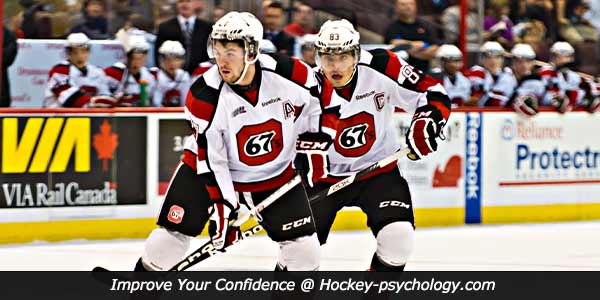Focus on Self-Improvement
Have you ever been benched for a period of time? How did it make you feel? Angry? Frustrated? Helpless?
Being benched happens for many reasons: arriving late for a game, missing practice, being disrespectful, making mistakes on the ice or playing poorly.
You may view this slight as being unfair:
“I only missed one practice, everyone on the team has missed a practice but they weren’t benched.”
“The coach doesn’t like me. He never liked me from day one. Now, I’m on the bench and other players who are not as good as me are getting playing time.”
“I only had one bad game. Everyone makes mistakes, but coach is trying to make an example of me.”
When coach benches you, it can feel unfair. If you put blame solely on your coach, you will feel powerless, hopeless, frustrated and angry.
When you have ill-feelings towards your coach or teammates, your attitude and motivation will change and your practice will suffer, making playing time harder to come by.
Regaining a sense of control and empowerment begins with looking inward. What part did you play in being benched? The first step in resolving your situation and relieving some of those negative emotions is to take personal responsibility for your part.
Take Personal Responsibility for Mistakes
When you take personal responsibility or react positively in unfavorable situations, you will grow as a person and as an athlete.
If you made mistakes during a game, watch and learn from the other players on the ice. What can you do differently? When cooler heads prevail, talk with your coach about what you could do better.
If you feel you are looking to get playing time, ask your coach what you can do to improve and help contribute to the team.
If you were late for a game, don’t make excuses. Explain unforeseen circumstances (if there were any), apologize, accept the consequences and assure your coach you will do everything in your power to be on time in the future.
Your situation may not be entirely your fault, but taking responsibility for your role is the first step to rectify the situation.
Columbus Blue Jackets’ center Pierre-Luc Dubois was benched early in the 2020-21 season. Dubois was the No. 3 overall pick in 2016 and led the Jackets with 49 points in 70 games last season.
Instead of complaining, Dubois kept the focus on himself.
DUBOIS: “That’s a coach’s decision. It’s out of my control. Like I said, I can be a better player. I know that, I acknowledge that. My play hasn’t been at the level that it can be at… The coach is paid to coach, and the players are paid to play, and there’s not much I can control in that decision… guys get benched, and I think it’s a thing they’ve got to learn from.”
Don’t allow negative emotions to hurt your motivation and confidence. Being proactive in your approach to adversity is always the best response.
How to Respond after Being Benched:
Ask yourself 2 questions:
- How can I improve my mindset and physical game to be ready to play?
- How can I be mentally prepared when my number is called to enter the game?
Taking personal responsibility is the fastest way to get back on the ice and grow as a hockey player.
Related Articles on Hockey Mental Game:
- How to Respond When Your Team is Down in a Playoff Series
- Your Mindset and Finishing Hockey Games
- How to Process Mistakes Like a Pro
*Subscribe to The Sports Psychology Podcast on iTunes
*Subscribe to The Sports Psychology Podcast on Spotify
The Mental Edge for Hockey

The Mental Edge for Hockey teaches you proven and simple mental game strategies so you can overcome fear of failure, lack of confidence, slumps or poor composure, take your practice game to competition, and boost your confidence in hockey. You learn simple, actionable mental game strategies to help you perform at your peak!
I’ve worked with athletes for 30 plus years – and know the top challenges that undermine performance when you perform in games. Now you can tap into my expertise and experience in coaching hockey players on the mental game.
In this program, you’ll learn the TOP 10 mental training lessons for hockey players – the same strategies I teach one-on-one athletes I coach on the mental game. My clients pay thousands of dollars for personal coaching, but now you can have the same strategies to improve your mental game – at a fraction of the price.

Leave a Reply